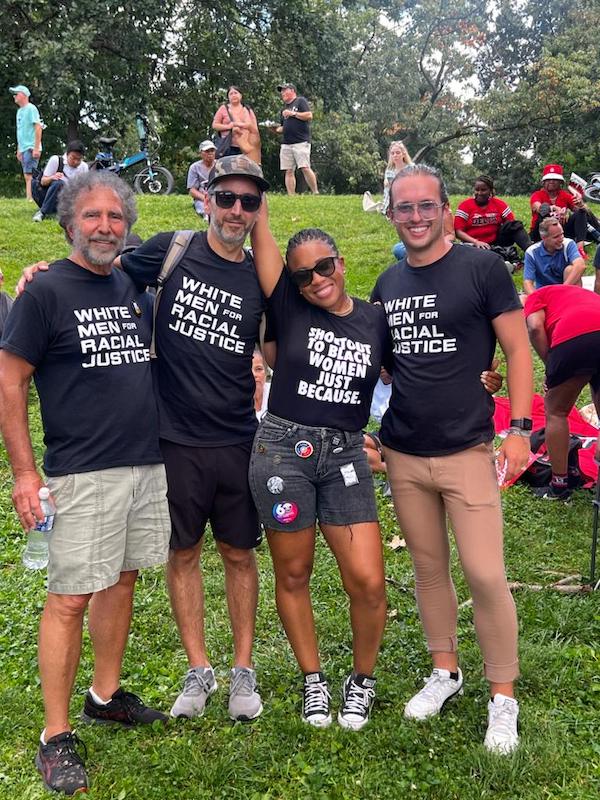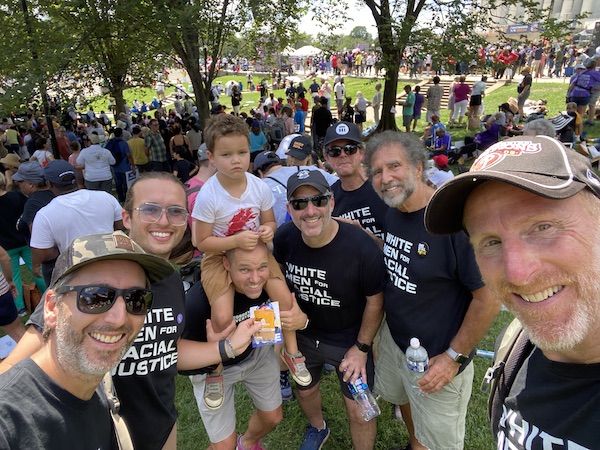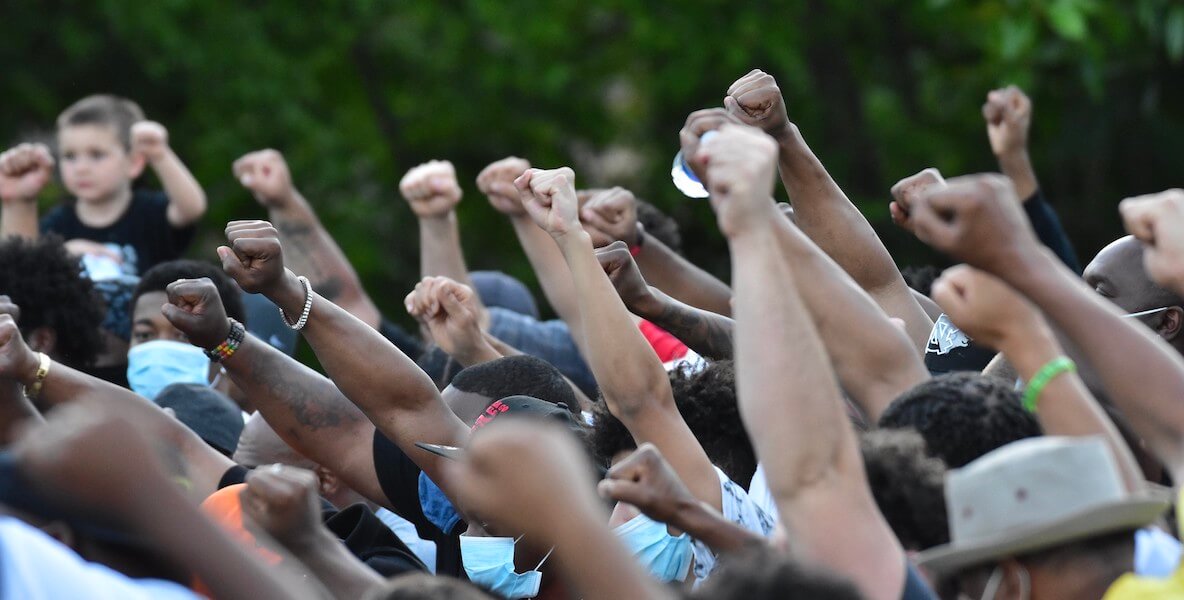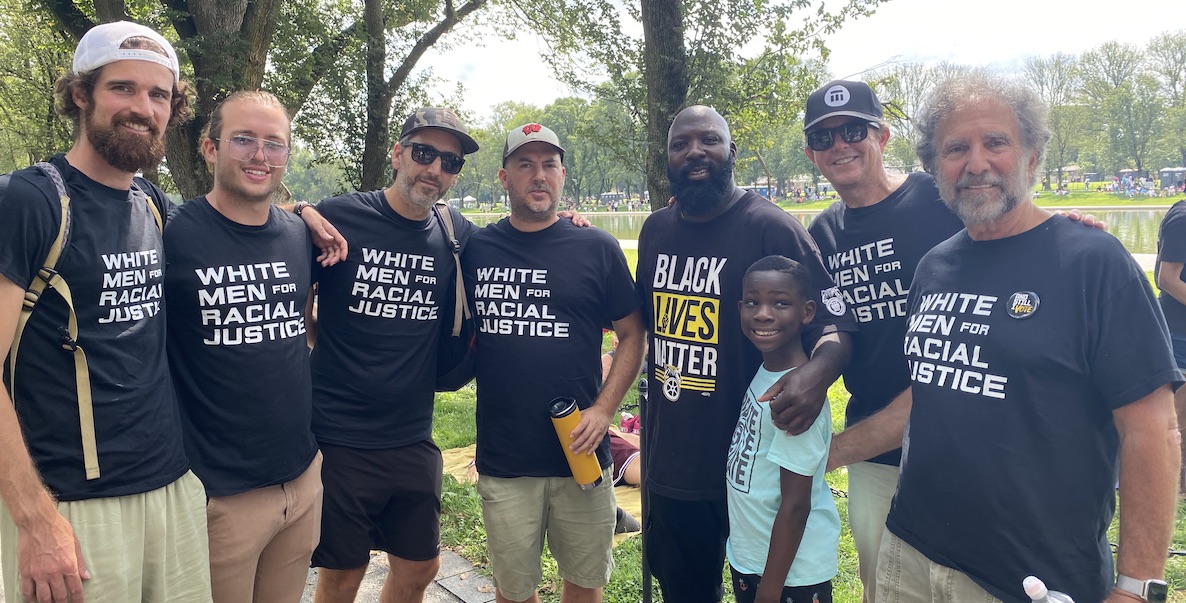“That’s what I’m talking about,” said one Black woman from New York City.
She was one of dozens of Black women and Black men who asked to take a picture of us as we walked around the Lincoln Memorial Reflecting Pool.
After a few hours of this, one man in our group said, “I’ve had more pictures taken of me today than at my wedding.”
We were a small group, ebbing and flowing between five and nine — not including the 5 year old son riding high on his dad’s shoulders — gathering together to be part of the March on Washington’s 60th Year Commemoration. We traveled from as close as Philadelphia and as far as California, all members of a national community called White Men for Racial Justice (WMRJ).
Usually, as soon as one person jumped into our hastily-forming semi-circle for a photo, one or two, sometimes three or four other people, most often Black women, would jump in to share the moment, or perhaps more accurately, to document the sighting.

Often, there would be people taking photos of the people taking photos. Lots of Black sororities and fraternities. Faith groups. Labor and community organizers. From California, Kentucky, and up and down the east coast from New York to Florida.
Understandably, some approached with questions, disbelief, even skepticism.
“I didn’t know what to make of this, so I had to circle back.”
“What’s all this about?”
“I felt a certain kind of way about it,” when, five minutes into a conversation, an older Black man was asked what he first felt when he saw a bunch of White guys wearing tee shirts that said White Men for Racial Justice.
Whether immediately or after a 2-10 minute conversation, at least a couple of which were recorded on video to share with other disbelievers, it was all smiles. We were the recipients of wave after wave of love and appreciation.
It was awkward.
It was awkward not only because it’s uncomfortable being photographed.
It was awkward not only because we were aware of how performative these tee shirts could understandably seem.
It was awkward not only because some of us are not used to wearing these tee shirts publicly, let alone answering questions, especially questions from Black people, about our community/organization called White Men for Racial Justice — “What are you actually doing?” or “What is ‘racial justice’ to you?”
It was most awkward because we were being told Thank you over and over and over.
It was most awkward because we were being treated as if we were celebrities (maybe more like unicorns).
Maybe showing up, and showing up consistently, is a first step. If nothing else, it seems to offer some hope to those who have been carrying this heavy weight largely without us for so long. If nothing else, it creates some accountability for us to not disappoint.
It was most awkward because we understand how low the bar is.
Thank you for showing up. Thank you for being a White man who shows up explicitly and publicly for racial justice. Thank you for wearing a tee shirt.
That is as low as the bar can go.
The understandable expectation is that White men will not show up.
The understandable expectation is that White men, who hold disproportionate power in every aspect of our society, are likely to be indifferent.
The understandable expectation is that White men will prioritize other things.
The understandable expectation is that White men will be resistant to this work.
The understandable expectation is that White men feel they lose if Black people win.
This seems to me why we were the recipients of “Thank you.” “Thank you.” “Thank you.”
We felt incredibly affirmed.
We also felt wrenchingly sad.
Maybe showing up is a first step
We were a half dozen or so guys wearing tee shirts. We, and the hundreds of others who are part of our WMRJ community, are all doing the work — the inner work to understand how Whiteness works in our own lives; and the outer work to reduce the impact that racial advantage and disadvantage have in all our lives.
We know that people of all races — White, Black, and in between — living in all places — rural, urban, and in between — are struggling, and we now know better how large, pervasive, and persistent the racial inequities are in every aspect of our society. As Maya Angelou said, “Knowing better, we now need to do better.”

We need to prioritize the racial and economic justice work that will not only benefit Black people, but will benefit all of us, including White people.
Maybe showing up, and showing up consistently, is a first step. If nothing else, it seems to offer some hope to those who have been carrying this heavy weight largely without us for so long. If nothing else, it creates some accountability for us to not disappoint.
Black women called us in to this work three years ago after the murder of George Floyd when they shared with some of us two things:
- They dared to be hopeful, seeing so many White people marching for Black lives.
- They noticed that they didn’t see many White men in those marches for Black lives.
We said we noticed the same thing.
What started as a single zoom call has become a vibrant community called White Men for Racial Justice (WMRJ). We are a community of hundreds of diverse White men from across the country with different ethnic backgrounds, faith traditions, income levels, sexual orientations, gender identities, political beliefs, and levels of understanding and comfort talking about race.
WMRJ gathers weekly to support each other to deepen our understanding of how Whiteness has shown up in our own lives and to deepen our commitment to take action to reduce racial inequity in every aspect of our society. We have come to understand that we are not doing this work to help others, but to create a better future for ourselves and our children.
On our walk back to our cars, a car idling at a red light honked and a Black woman rolled down her passenger window to give us a loving shout out.
The purpose of the tee shirts is to catalyze conversations. Success.
We didn’t realize the tee shirts could also be a source of joyful solidarity … and accountability.
Jay Coen Gilbert is the co-founder and former CEO of B Lab and founder of IMPERATIVE 21.
The Citizen welcomes guest commentary from community members who represent that it is their own work and their own opinion based on true facts that they know firsthand.
![]()
MORE ON RACIAL JUSTICE IN THE PHILADELPHIA CITIZEN
White Men For Racial Justice members at the 60th Anniversary of the March on Washington, August 2023.



